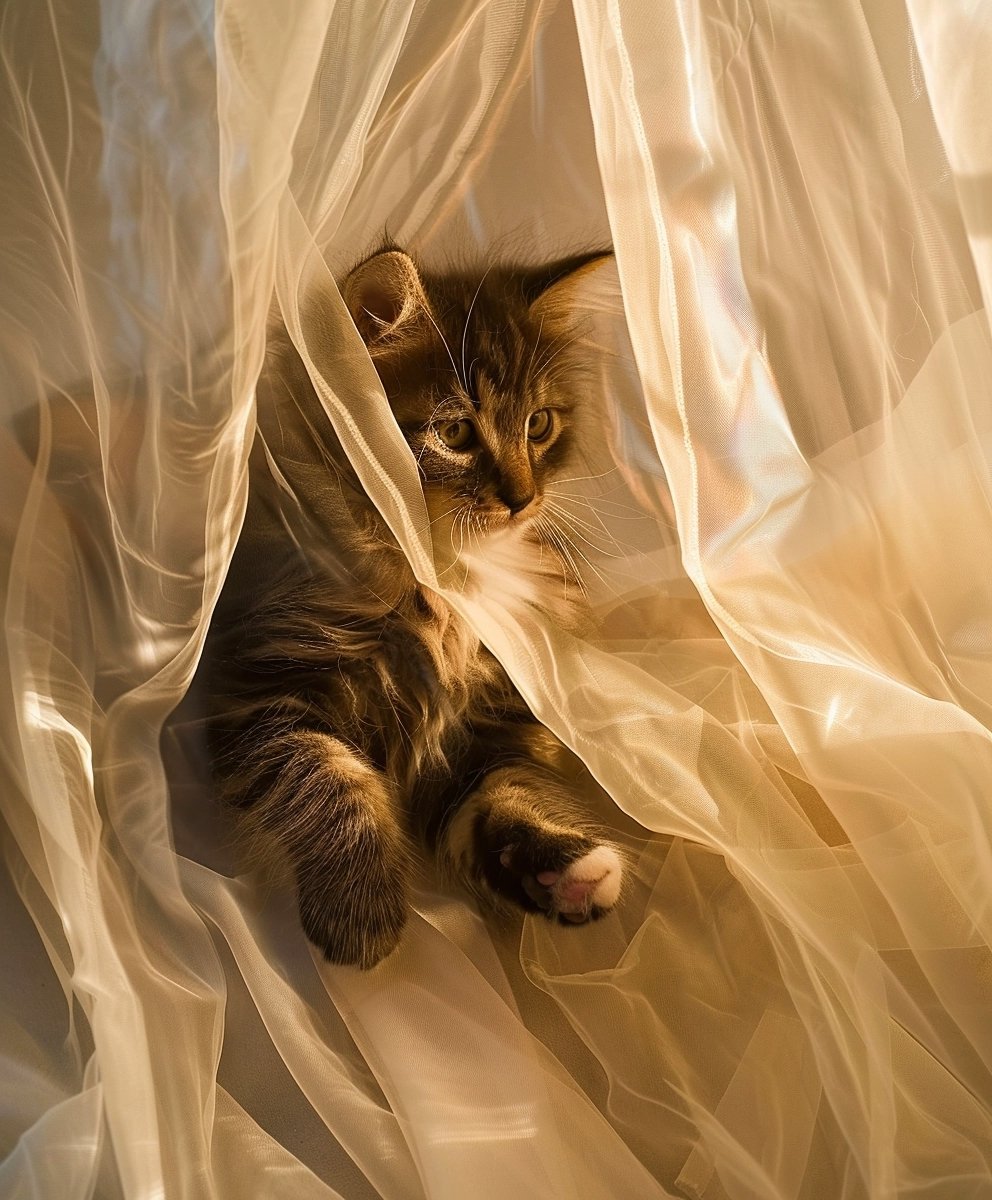Cats with sensitive stomachs can be challenging to care for, especially when it comes to selecting the right food. You need to choose highly digestible cat food that avoids irritating ingredients. This is crucial for keeping your feline friend comfortable and healthy.
With a variety of options available, knowing what to look for can make a significant difference in your cat’s well-being and happiness.
You may find that foods rich in high-quality proteins and essential nutrients help alleviate digestive issues.
It’s important to pay attention to specific brands and ingredients tailored for sensitive stomachs.
These can provide the nutrition your cat needs without causing discomfort.
Adopting the right feeding strategies can also enhance their digestive health and overall quality of life.
Making informed choices about your cat’s diet can lead to a happier, healthier pet.
By focusing on their unique needs and exploring the best food options available, you can ensure they thrive despite their sensitive stomachs.
Key Takeaways
- Selecting digestible cat food is essential for your cat’s digestive health.
- Key ingredients can support comfort and well-being in sensitive cats.
- Feeding strategies play a vital role in managing sensitive stomach issues.
Understanding Sensitive Stomachs in Cats
Sensitive stomachs in cats can lead to various digestive issues that affect your pet’s overall well-being.
It’s essential to recognize the causes, symptoms, and when to involve a veterinarian to ensure your cat’s health.
Causes of Digestive Issues in Cats
You may find that your cat has a sensitive stomach due to several reasons. Food allergies are a common cause and can result in reactions ranging from mild discomfort to severe gastrointestinal issues.
Common allergens include dairy, grains, and certain proteins.
Food intolerances also play a significant role.
Unlike allergies, intolerances may not involve the immune system but can still lead to upset stomachs.
Inflammatory bowel disease (IBD) is another medical condition that can provoke digestive disturbances.
In this case, the intestinal walls become inflamed, affecting nutrient absorption.
Lastly, diet changes, such as introducing new foods too quickly, can disrupt your cat’s digestive health.
Signs of Sensitive Stomach in Cats
Identifying when your cat suffers from a sensitive stomach is crucial.
Watch for common signs including frequent vomiting, diarrhea, and flatulence.
You might also notice your cat is more lethargic or exhibits changes in appetite, either eating less or expecting more food than usual.
Behavioral changes can accompany these symptoms.
If your cat is hiding, grooming excessively, or seems anxious, it could indicate digestive discomfort.
Keeping a close eye on these signs is essential for timely intervention.
When to Consult a Vet
If your cat displays persistent symptoms like vomiting or diarrhea lasting more than 24 hours, it’s time to consult your veterinarian.
They can help identify if it’s a mild issue or something more complex, such as gastrointestinal diseases.
Additionally, if your cat stops eating or shows signs of dehydration, seek veterinary advice immediately.
A thorough examination can help rule out conditions such as IBD or chronic food intolerances.
Your vet may recommend specific diagnostic tests to pinpoint the problem, ensuring your cat receives the appropriate treatment and diet adjustments for better digestive health.
Selecting the Right Cat Food
Choosing the right food for your cat with a sensitive stomach is crucial for their overall health.
Quality ingredients and digestive support can make a significant difference.
Here are some key factors to consider when selecting cat food.
The Importance of High-Quality Ingredients
High-quality ingredients are vital for cats with sensitive stomachs.
Look for cat food that lists real meat as the first ingredient.
Ingredients like chicken, turkey, and fish provide essential proteins without irritants.
Avoid foods with common allergens such as corn, wheat, and soy.
Instead, opt for formulas with natural ingredients to minimize digestive upsets.
Foods with limited ingredient lists are often easier on your cat’s stomach.
These types typically contain fewer potential allergens, focusing on what your cat truly needs.
Understanding Food Labels
When checking food labels, pay close attention to the first five ingredients.
This section provides insight into the quality of the food.
If you see fillers or artificial additives, it’s best to consider alternatives.
Look for grain-free options if grains seem to upset your cat’s stomach.
Also, consider foods with specified protein sources rather than generic terms like “meat meal.”
Familiarize yourself with marketing terms. “Natural,” “holistic,” or “premium” don’t always guarantee quality.
Instead, prioritize brands known for using high-quality, ethically sourced ingredients.
The Role of Probiotics and Prebiotics
Probiotics and prebiotic fibers can be game changers for cats with sensitive stomachs.
Probiotics help maintain a balanced gut microbiome, improving digestion and reducing issues like gas and diarrhea.
Adding prebiotic fibers from ingredients such as chicory root can support the growth of beneficial bacteria in your cat’s gut.
This fiber acts as food for probiotics, enhancing their digestive powers.
Choose foods specifically formulated for digestive health.
Many of the best cat foods for sensitive stomachs now include these beneficial additives.
Regularly feeding your cat these can lead to better stool quality and overall gut health.
Types of Cat Food for Sensitive Stomachs
When choosing food for your cat with a sensitive stomach, it’s essential to understand the different types available.
Each type has unique characteristics that may suit your cat’s needs better than others.
Wet vs. Dry Cat Food
Wet cat food generally contains higher moisture levels, which can aid digestion.
This extra hydration can be beneficial if your cat is prone to gastrointestinal issues.
Wet food is often more palatable, making it easier for finicky eaters to consume.
Dry cat food, on the other hand, is more convenient and has a longer shelf life.
It provides varying nutritional options and can help keep your cat’s teeth cleaner.
However, it might be less digestible than wet food, which is a vital consideration for cats with sensitive stomachs.
Limited Ingredient Diets
Limited ingredient diets focus on providing fewer components, reducing the chances of irritating your cat’s stomach.
These diets often feature a single protein source and minimal carbohydrates, which can help you pinpoint food intolerances.
For example, a limited ingredient cat food might contain chicken or lamb as the primary protein.
Always check the ingredient list to ensure that potentially irritating fillers, such as grains or artificial additives, are minimized.
Novel Protein Sources
Cats with sensitive stomachs may benefit from diets featuring novel protein sources, such as venison, duck, or rabbit.
Using proteins that your cat hasn’t previously eaten can reduce the risk of allergic reactions or digestive issues.
These proteins are often found in specialty diets designed for cats with food sensitivities.
By introducing a novel protein, you can help diversify your cat’s nutrition while reducing the likelihood of discomfort or upset stomach.
Grain-Free Options
Grain-free cat food is another suitable choice for cats with sensitive stomachs.
Many grains can cause digestive upset in some cats, and grain-free formulas often replace grains with alternative carbohydrates like potatoes or peas.
While grain-free foods can be beneficial, it’s essential to ensure they provide a balanced diet.
Look for high-quality protein sources to ensure your cat gets the essential nutrients needed for a healthy life.
Hydrolyzed Protein Diets
Hydrolyzed protein diets are designed to minimize allergic reactions.
In these diets, proteins are broken down into smaller molecules, making them less likely to provoke a response in sensitive cats.
This type of diet is often used in veterinary settings, especially when diagnosing food allergies.
It’s a good option if you suspect your cat has specific food sensitivities and requires a diet overhaul to stabilize their health.
Feeding Strategies for Cats with Sensitive Stomachs
Feeding cats with sensitive stomachs requires careful attention to their dietary habits and food choices.
Implementing effective strategies can ease digestive issues and enhance your cat’s overall well-being.
Meal Frequency and Portion Sizes
Adjusting your cat’s meal frequency may help reduce digestive upset.
Instead of feeding one or two large meals, consider offering smaller portions three to four times a day.
This approach can prevent overeating and give their stomachs a chance to digest food more comfortably.
Portion Control Tips:
- Measure meals to avoid overfeeding.
- Use a food scale for accuracy.
- Monitor your cat’s reaction to different portion sizes and adjust accordingly.
Incorporating dietary fiber, especially soluble fiber, can also aid digestion.
Fiber helps regulate bowel movements and can alleviate diarrhea or constipation.
Look for high-quality cat food that contains these beneficial fibers.
Transitioning to a New Food
When switching your cat’s diet, a gradual approach is best.
Abrupt changes can lead to gastrointestinal stress, worsening sensitive stomach symptoms.
Transition Steps:
- Start by mixing 25% of the new food with 75% of the old food.
- Maintain this mix for about three days.
- Gradually increase the new food to 50%, then 75%, and finally to 100% over the next week.
Choose cat foods specifically formulated for sensitive stomachs.
Check for high protein content and limited ingredients which may help your cat adapt more easily.
Maintaining Hydration
Adequate hydration is crucial for cats, especially those with sensitive stomachs.
Encouraging your cat to drink sufficient water can aid digestion and nutrient absorption.
To ensure hydration:
- Provide fresh water daily.
- Consider wet cat food options, which have higher moisture content.
- Use a pet water fountain, as many cats prefer running water.
Ensure your cat’s bowl is clean and free from food particles to encourage them to drink more.
Keeping track of their hydration can help you identify any changes that could signal digestive distress.
Popular Brands and Products
When selecting food for cats with sensitive stomachs, it’s important to consider brands known for their digestibility and overall quality.
Several popular products have been formulated specifically for this need, focusing on ingredients that promote digestive health and minimize irritation.
Blue Buffalo and Blue True Solutions
Blue Buffalo offers a range of cat foods designed for sensitive stomachs.
Their True Solutions Blissful Belly line features a blend of easily digestible protein sources and prebiotic fibers.
This combination aims to support gut health and enhance nutrient absorption.
Another option is Blue Buffalo Sensitive Stomach Chicken Recipe.
This recipe uses real chicken as the first ingredient, ensuring your cat gets quality protein without the heavy fillers often found in lower-quality foods.
Both options are free from artificial preservatives and corn, which helps reduce potential allergens.
Purina One, Wellness Core, and Halo Holistic
Purina One Sensitive Stomach utilizes high-quality ingredients, including real turkey and probiotics.
This recipe helps maintain a healthy digestive system while providing essential nutrients.
Wellness Core Digestive Health is another excellent choice, packed with probiotics and focused on supporting gut health.
This grain-free formula is designed with a balance of proteins and fats to keep your cat satisfied without causing digestive upsets.
Halo Holistic offers various recipes that prioritize whole meats and nutrient-dense ingredients.
Their cat food formulas can be beneficial for cats with digestive issues, as they avoid common allergens and incorporate digestible proteins.
Specialized Veterinary Diets
For cats with particularly sensitive stomachs, specialized veterinary diets can be the best option. Royal Canin Digestive Care is specifically formulated with fibers and prebiotics that promote digestive health.
This makes it easier for cats to absorb nutrients and maintain gut balance.
Hill’s Prescription Diet is another notable brand with options designed for sensitive stomachs.
Their gastrointestinal formulas contain easily digestible ingredients and a balanced blend of fibers to support healthy digestion.
Additionally, Solid Gold offers sensitive stomach formulas rich in omega fatty acids, which can help reduce inflammation in the digestive tract.
Supplementing Cat Diet
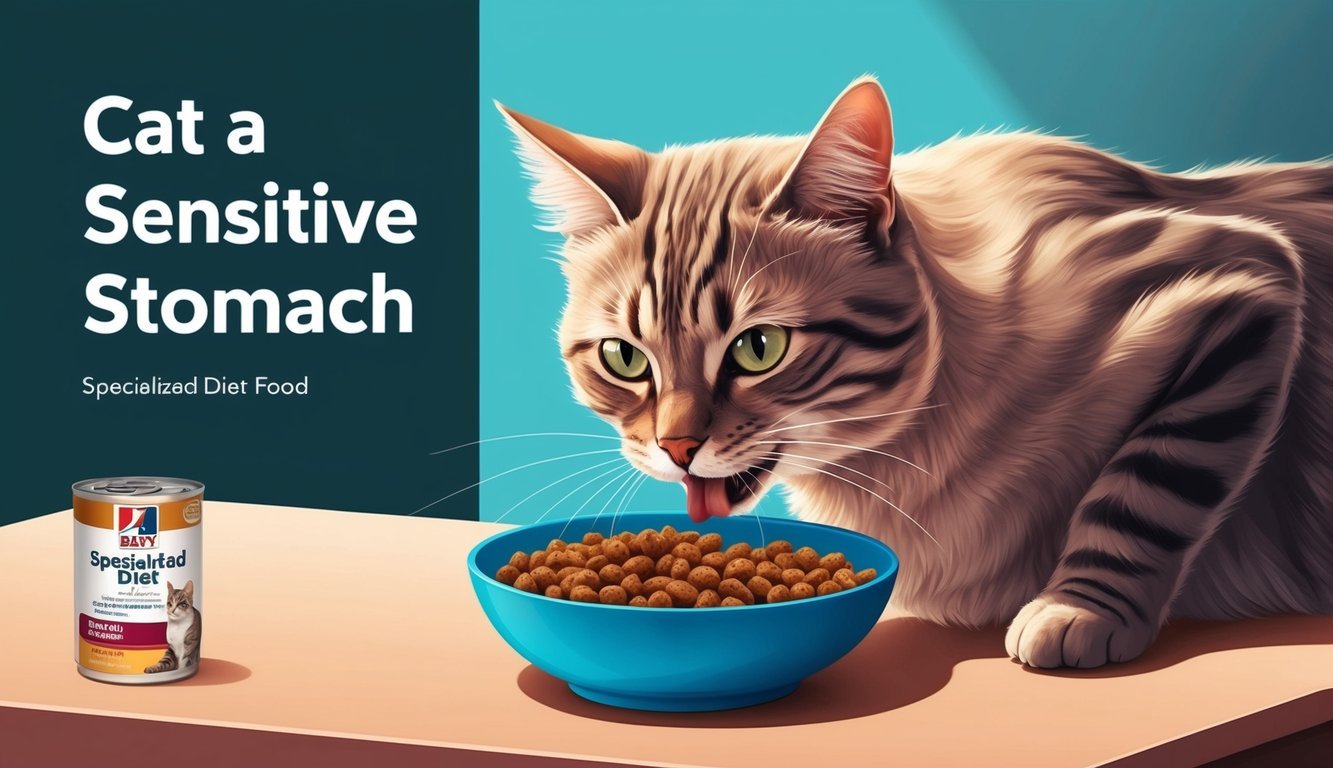
When managing a cat’s sensitive stomach, supplementation can play a vital role.
Focusing on key nutrients can enhance digestion and overall health.
This section explores omega-3 fatty acids and natural supplements that may benefit your feline friend.
Omega-3 and Other Nutritional Supplements
Omega-3 fatty acids are essential for maintaining your cat’s health.
They can reduce inflammation and support digestive health.
Fish oil is a common source.
Consider incorporating brands like I and Love and You, which offer omega-rich formulations designed for cats.
Provide a daily supplement that contains these fatty acids in a digestible form.
Consult your veterinarian for the appropriate dosage based on your cat’s weight.
Other nutritional supplements, such as high-quality probiotics, may also help balance gut bacteria and improve digestion.
Natural Supplements and Herbal Remedies
In addition to omega-3s, natural supplements can support your cat’s intestinal health.
Consider options like slippery elm or pumpkin.
Slippery elm can soothe the digestive tract, while pumpkin is high in fiber and helps regulate bowel movements.
You might also explore highly digestible cat food options.
Look for formulas that list specific protein sources and low allergens.
Foods with limited ingredients allow you to monitor your cat’s reactions closely.
Always consult your vet before introducing new supplements or herbal remedies to ensure they’re safe for your cat’s specific needs.
Home Remedies and Preventative Measures
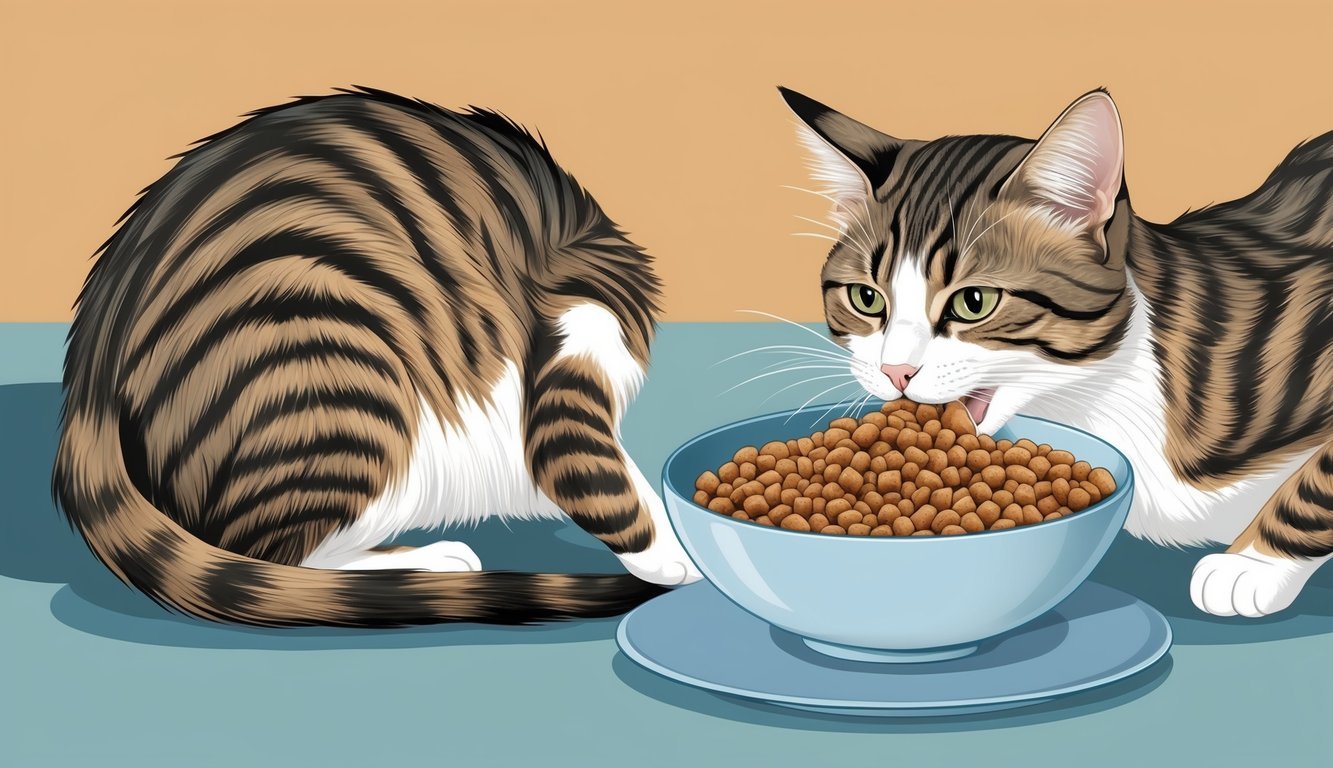
When dealing with a cat that has a sensitive stomach, you can take several practical steps.
Focusing on homemade food and effective prevention can make a significant difference in your cat’s digestive health and overall well-being.
Homemade Food Recipes
Making your own cat food allows you to control ingredients and customize meals for your furry friend.
Here are a couple of simple recipes that can ease stomach issues:
-
Chicken and Rice Delight
- Ingredients: 1/2 cup cooked chicken, 1/4 cup rice, 1/4 cup vegetable broth.
- Instructions: Shred the chicken and mix it with rice and broth. Serve once cooled.
-
Salmon and Sweet Potato Stew
- Ingredients: 1/4 cup canned salmon, 1/4 cup mashed sweet potato, 1/4 cup water.
- Instructions: Blend ingredients until smooth, then serve.
These meals are not only nutritious but also easy for your cat to digest.
Always introduce new foods gradually to avoid further digestive upset.
Preventing Hairballs and Other Issues
Preventing hairballs is crucial for cats with sensitive stomachs, as they can aggravate digestive problems.
Here are effective strategies:
-
Regular Grooming: Brush your cat frequently to reduce shedding. This minimizes hair intake during grooming.
-
High-Fiber Diet: Incorporate natural cat food with higher fiber content. This aids digestion and helps hair pass through the intestines.
-
Hydration: Ensure your cat has access to fresh water. Proper hydration helps with digestion and reduces hairball formation.
-
Interactive Play: Engage in regular playtime to reduce stress. Stress can worsen digestive problems.
Essential Nutrients for Digestive Health
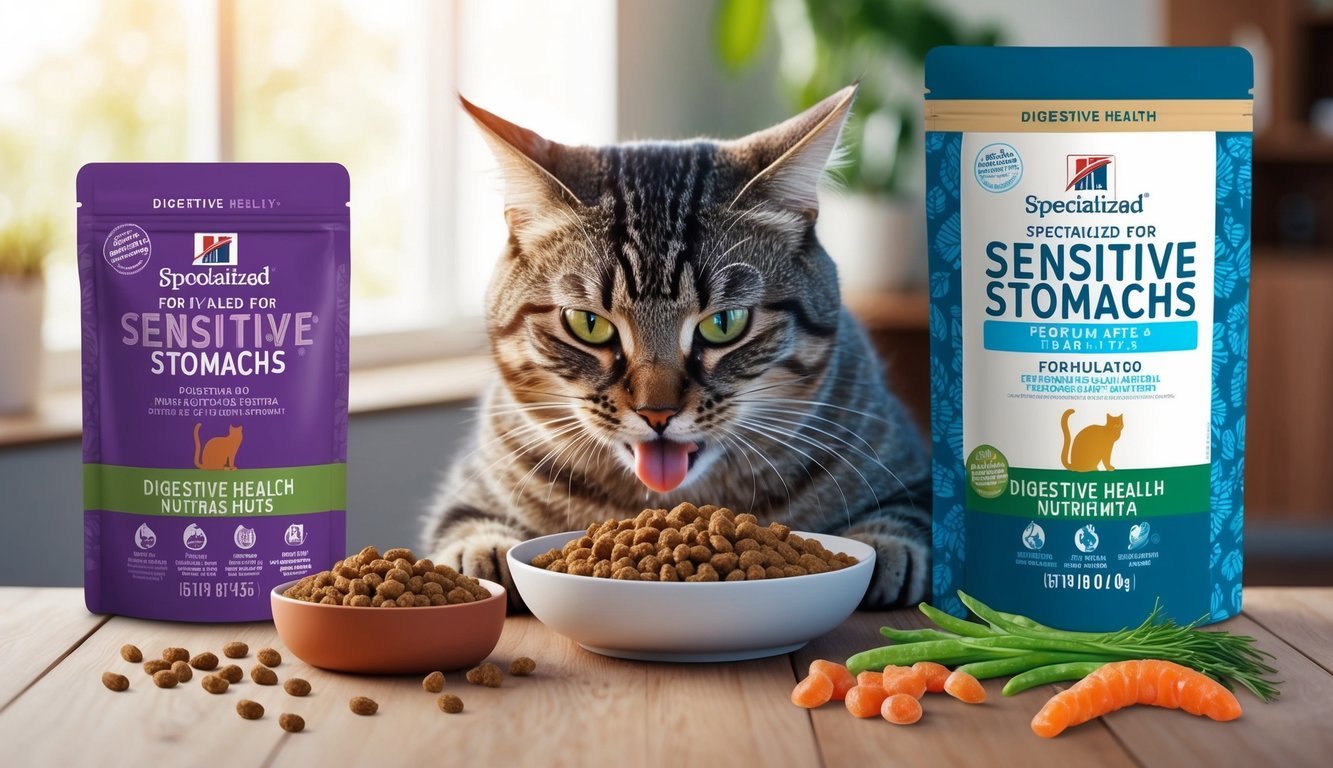
To support your cat’s digestive health, it’s important to focus on specific nutrients that can improve gut function and overall well-being.
Fiber plays a crucial role in digestion, while vitamins and minerals ensure your cat receives balanced nutrition.
Fiber: Soluble vs. Insoluble
Dietary fiber is essential for maintaining a healthy digestive system in cats.
It comes in two types: soluble and insoluble.
-
Soluble Fiber: This type dissolves in water and forms a gel-like substance in the gut. It helps manage blood sugar levels and can slow down digestion, which is beneficial for cats with sensitive stomachs. Ingredients like beet pulp provide soluble fiber, promoting a good balance in the diet.
-
Insoluble Fiber: This does not dissolve in water, aiding in the movement of food through the digestive tract. It can help prevent constipation, ensuring that your cat’s gastrointestinal system remains active. An example of insoluble fiber is wheat bran.
Including a mix of both fibers in your cat’s food can ensure a healthier digestive process.
Vitamins and Minerals
Vitamins and minerals are critical for optimal digestive health.
They aid in various metabolic processes and enhance nutrient absorption.
-
B Vitamins: Vital for energy metabolism and maintaining a healthy appetite, B vitamins (like B12 and B6) support digestive enzymes, playing a major role in breaking down food.
-
Zinc: This mineral helps maintain the integrity of the gut lining. Low levels can lead to poor digestion and nutrient absorption.
-
Electrolytes: Sodium, potassium, and magnesium are important for hydration and digestive function. They help regulate muscle contractions in the intestines.
Ensure your cat’s food is fortified with these essential nutrients, fostering a well-rounded diet that supports digestive health.
What to Avoid
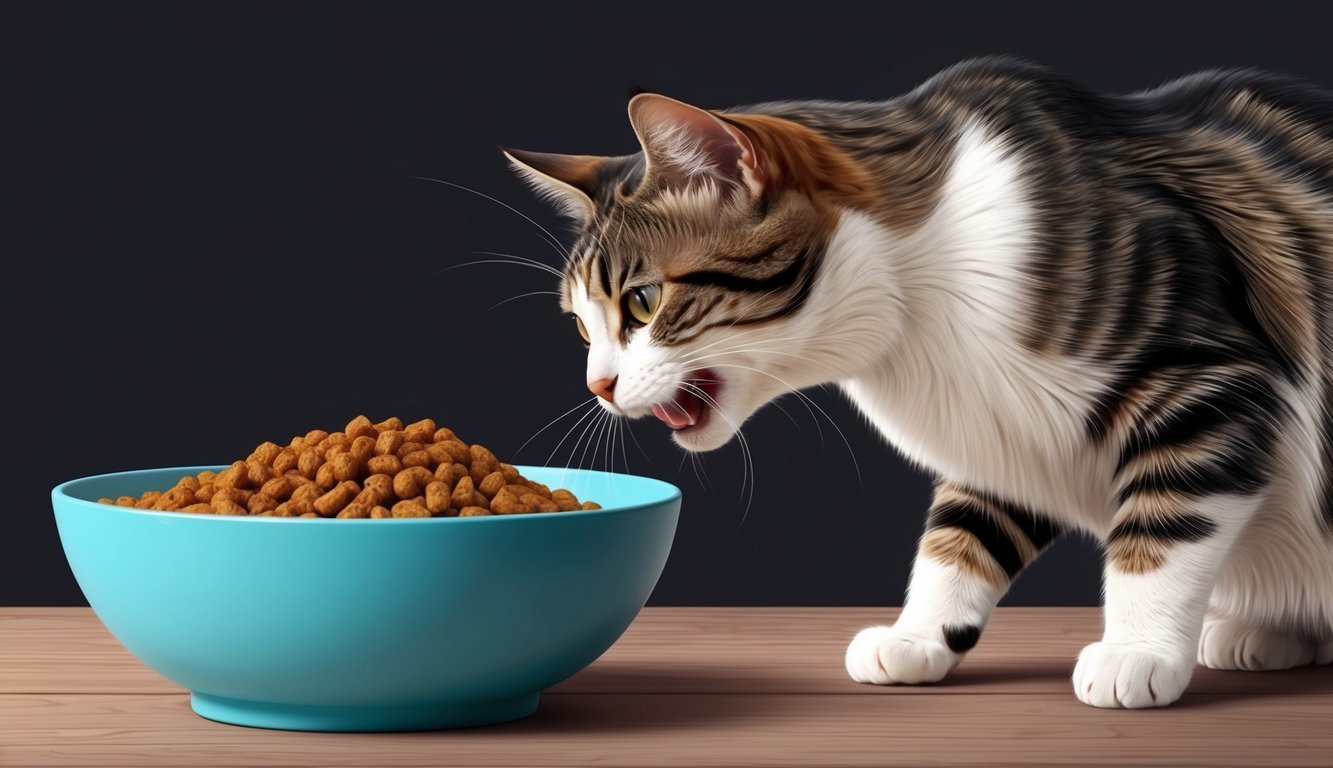
When selecting food for cats with sensitive stomachs, understanding what to avoid is crucial.
Certain ingredients can trigger sensitivities, leading to discomfort and digestive issues.
Here’s what you should keep an eye out for.
Common Food Additives and Allergens
Many commercial cat foods contain additives that might not sit well with your cat’s digestive system.
Avoid foods with these common additives:
- Artificial colors and flavors: These offer no nutritional value and can cause allergic reactions.
- Preservatives: Chemicals like BHA, BHT, and ethoxyquin can be harsh on sensitive stomachs.
Also, consider common allergens such as:
- Wheat and gluten: Often found in many dry foods, these can be tough on some cats’ digestion.
- Dairy: Despite popular belief, many cats are lactose intolerant.
Always check the ingredient list to ensure these elements aren’t included in your cat’s diet.
Ingredients That Can Aggravate Sensitivities
Certain ingredients can aggravate sensitivities, leading to discomfort.
It’s best to avoid the following:
- High-fat ingredients: Foods high in fat can cause digestive upset. Look for moderate fat levels instead.
- Rich proteins: Ingredients like beef or lamb can also be problematic. Opt for lighter proteins like turkey or chicken.
Avoiding grains and fillers is also wise since many cats can’t digest them well.
You might consider:
- Hydrolyzed proteins: These can be easier to digest and are often used in sensitive diets.
- Limited ingredient diets: These help minimize potential triggers.
By steering clear of these additives and ingredients, you can help keep your cat’s stomach calm and healthy.
Consulting with Professionals
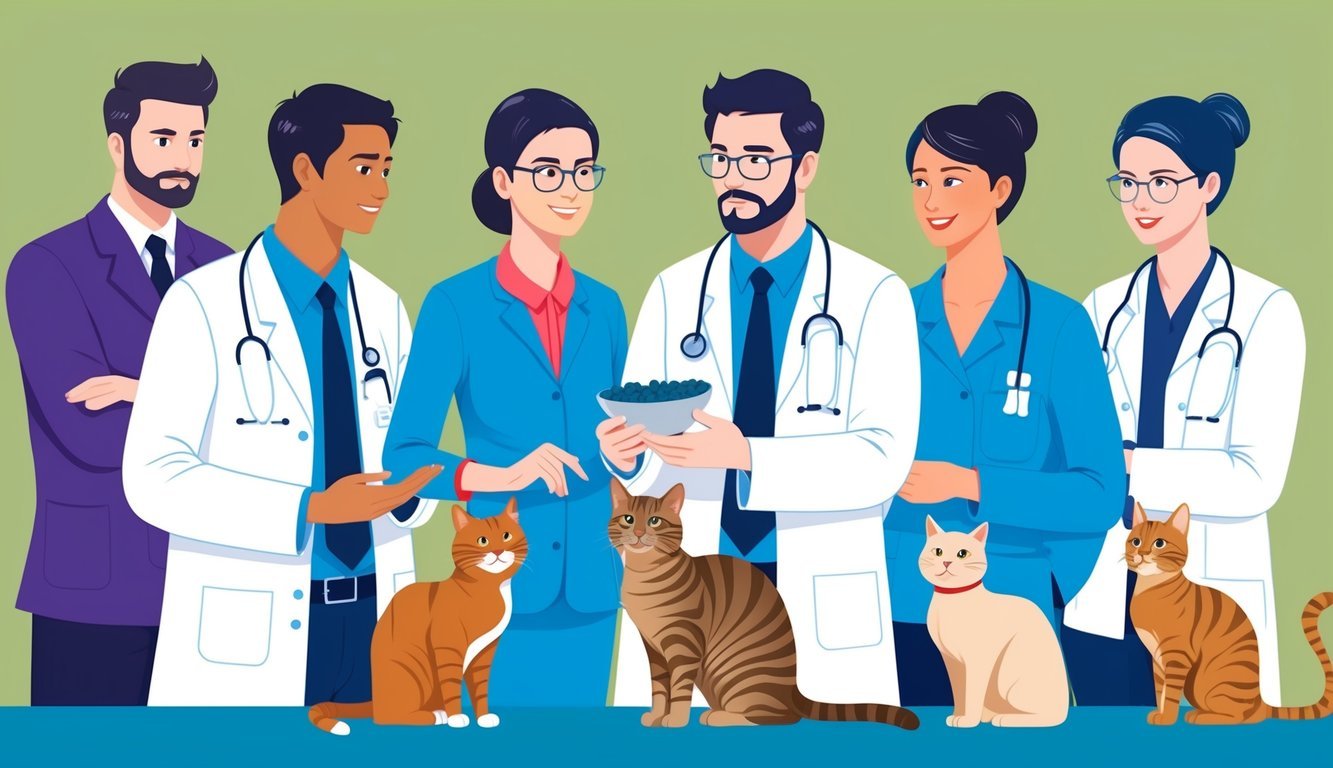
When dealing with a cat that has a sensitive stomach, consulting with the right professionals is vital.
Working with a veterinary nutritionist can provide tailored guidance, while understanding the dry matter basis is crucial for making informed dietary choices.
Working with a Veterinary Nutritionist
A veterinary nutritionist specializes in the dietary needs of pets, and they can help you navigate the complex world of cat food.
They assess your cat’s health, lifestyle, and any specific sensitivities or allergies.
In your sessions, you might discuss:
- Specific Nutritional Needs: Your cat’s age, weight, and any health concerns.
- Ingredient Selection: Identifying which ingredients are soothing and which to avoid.
- Feeding Strategies: They may recommend certain feeding schedules or portion sizes.
The tailored plan they create will ensure your cat receives all essential nutrients without aggravating its sensitive stomach.
Understanding the Dry Matter Basis
The dry matter basis helps you accurately compare nutritional content in cat foods.
This approach assesses the food’s nutrients after moisture has been removed, making it easier to understand the actual nutrition your cat receives.
To calculate the dry matter basis, use this formula:
- Find the Moisture Content: Check the label for the percentage of moisture.
- Subtract from 100: Get the dry matter percentage (e.g., if moisture is 78%, dry matter is 22%).
- Adjust Nutrient Values: Divide nutrient percentages by the dry matter percentage to compare.
This method allows you to make side-by-side comparisons of different foods, ensuring you’re selecting the best option for your cat’s sensitive stomach.
Frequently Asked Questions

When it comes to selecting food for cats with sensitive stomachs, you may have various queries.
This section addresses some common questions regarding meal options, ingredients, and dietary solutions.
What are the best homemade meal options for cats with digestive issues?
You can prepare simple meals using proteins like boiled chicken or turkey, along with easily digestible carbohydrates such as rice or pumpkin.
Make sure to avoid any seasonings or sauces, as these can irritate your cat’s stomach.
Which natural ingredients are recommended for a cat with a sensitive stomach?
Natural ingredients like pumpkin, plain yogurt, and easily digestible proteins are excellent choices.
Additionally, you might consider adding oats or sweet potatoes, which can be gentle on the digestive system.
How can I identify the most suitable wet food options for my cat with a sensitive stomach?
Look for wet foods labeled as grain-free and hypoallergenic.
Ingredients like shredded chicken or fish in the first few spots on the label indicate a good source of protein without fillers that could upset your cat’s stomach.
What are effective dietary solutions for a cat that experiences frequent vomiting?
A limited-ingredient diet can help pinpoint problematic foods.
Consider formulas designed specifically for sensitive stomachs, often containing ingredients that are easier on the digestive system, such as those rich in probiotics.
Can you suggest dry cat food brands that cater to felines with sensitive digestive systems?
Brands like Hill’s Science Diet, Royal Canin, and Wellness offer dry food specifically formulated for sensitive stomachs.
Look for options that have easily digestible proteins and avoid artificial additives.
What home remedies are helpful for cats dealing with upset stomach or diarrhea?
Ginger can be soothing for a cat’s stomach.
However, consult your vet before adding it to their diet.
You might also try offering a small amount of plain, unsweetened pumpkin to help firm up their stool.

